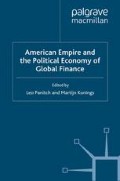Abstract
The debate that emerged over the last decade about the nature of the present world order — the degree to which an era of American empire or hegemony was being consolidated (Gill 2003; Panitch and Gindin 2004, 2005a), or whether we are in a period of monumental transformation and relocation of supremacy (Wallerstein 2006; Arrighi 2007) — touched on a huge series of significant theoretical and empirical issues, one of the most central being how to read the tendency of capitalism to produce crises and capitalist states’ ability to manage, redirect and elide them, generally to their own advantage. This chapter addresses some of the issues that stem from this debate, above all whether the centrality of the American state and political economy in the post-Bretton Woods era consolidated in an institutional form within which actors were sufficiently aware so as to manage with relative efficiency the process of capitalist accumulation. Focusing on the US Federal Reserve system since 1970, we shall argue that the American state in fact developed significant managerial capacities, particularly relative to other institutional bodies and state agencies. This took place only very unevenly, in fits and starts, and has only recently been consolidated. Moreover, the Fed did not always develop such managerial capacities with either the strategic intent of doing so, or the immediate understanding that they had done so; as often as not key capacities developed and emerged almost by accident, in the context of panicked attempts to manage crises. Nevertheless, in the process of ‘globalization’ the Fed certainly became, both structurally and politically, one of the primary state agencies involved in the global extension andmanagement of the American empire.1
Access this chapter
Tax calculation will be finalised at checkout
Purchases are for personal use only
Preview
Unable to display preview. Download preview PDF.
Editor information
Editors and Affiliations
Copyright information
© 2009 Eric Newstadt
About this chapter
Cite this chapter
Newstadt, E. (2009). Neoliberalism and the Federal Reserve. In: Panitch, L., Konings, M. (eds) American Empire and the Political Economy of Global Finance. International Political Economy Series. Palgrave Macmillan, London. https://doi.org/10.1057/9780230227675_5
Download citation
DOI: https://doi.org/10.1057/9780230227675_5
Publisher Name: Palgrave Macmillan, London
Print ISBN: 978-0-230-23608-0
Online ISBN: 978-0-230-22767-5
eBook Packages: Palgrave Political & Intern. Studies CollectionPolitical Science and International Studies (R0)

